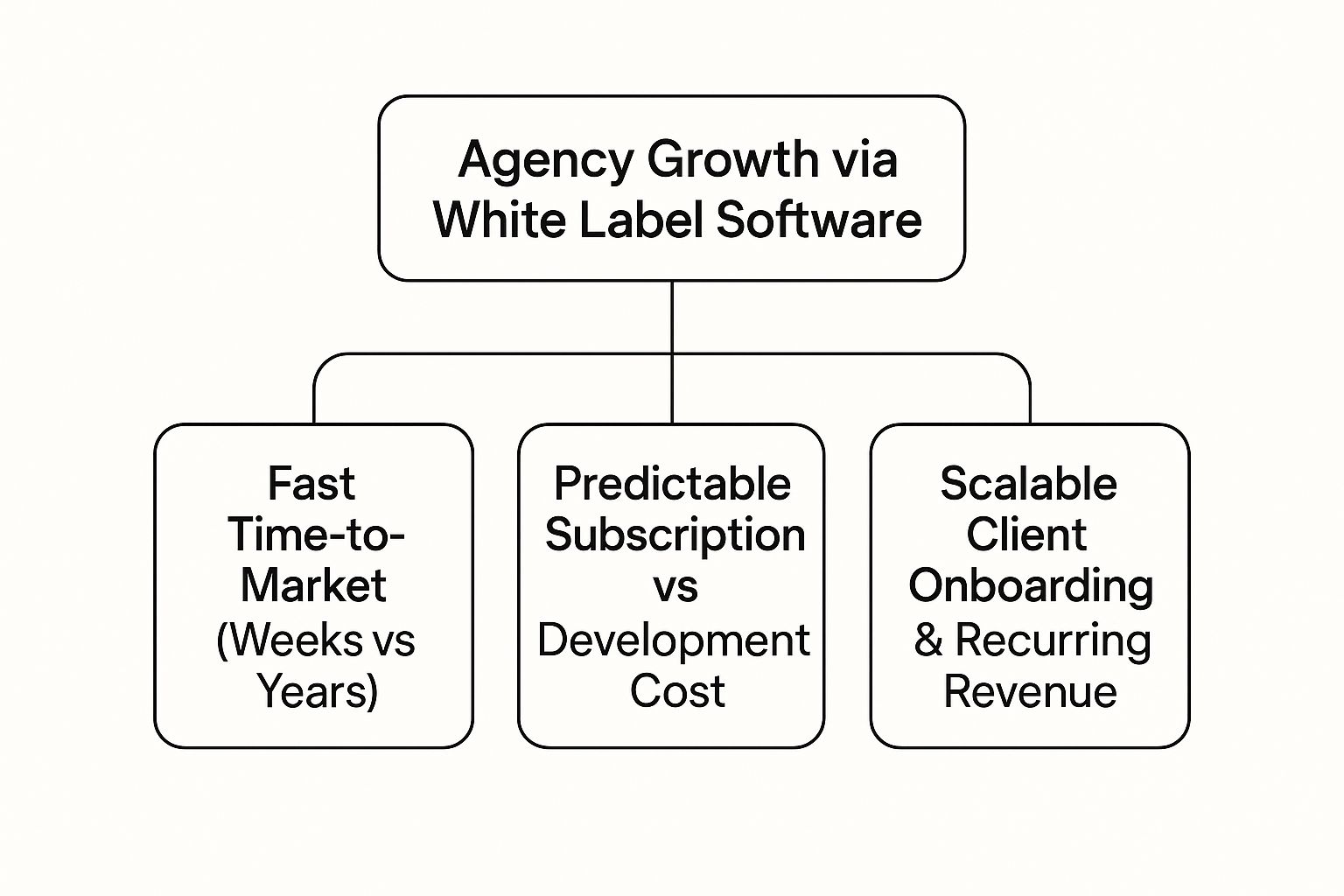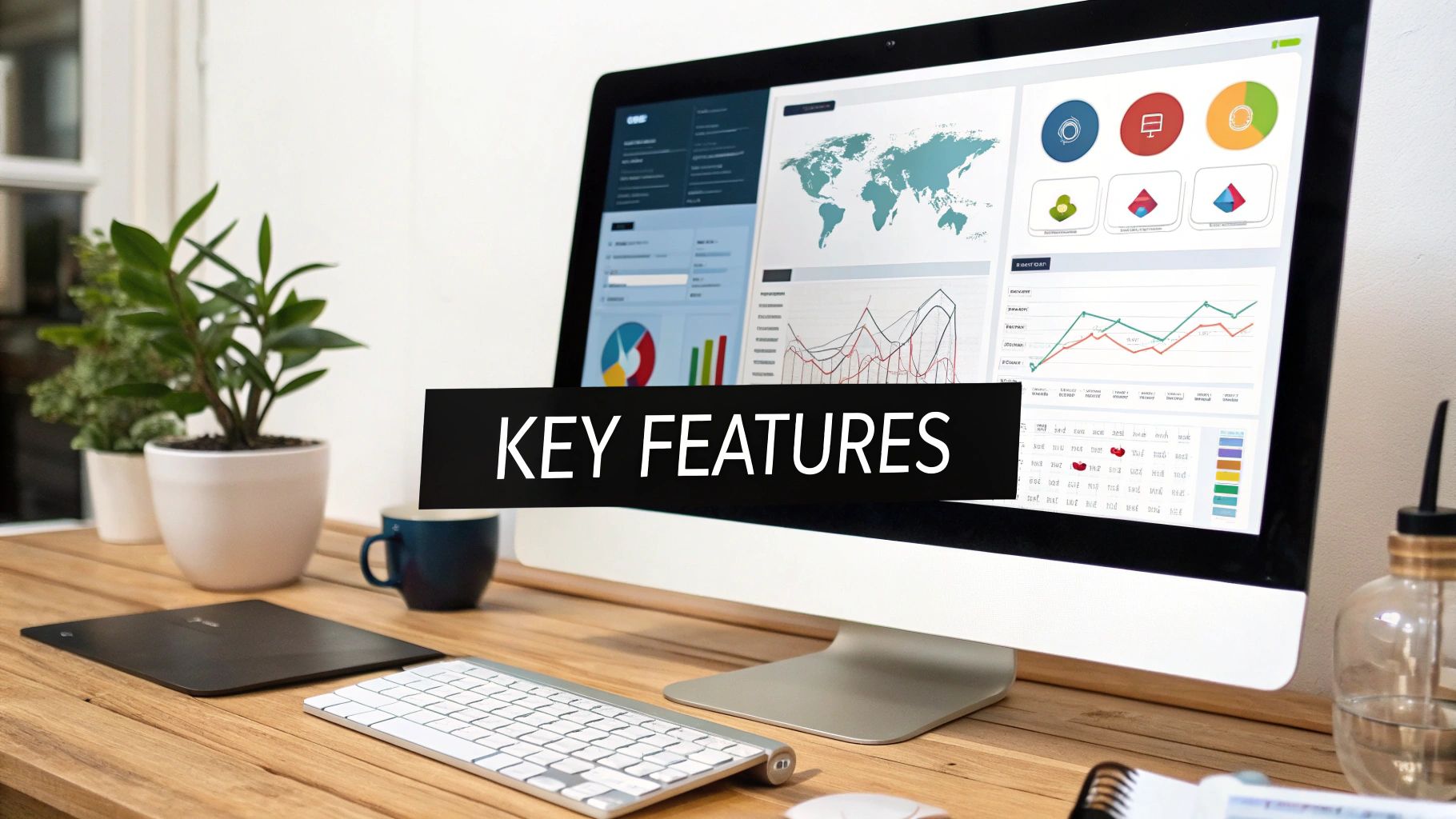Ever heard the term white label and wondered what all the fuss was about? In the marketing world, it's a concept that can seriously level up an agency's game.
Think of it like this: a high-end coffee roaster perfects a fantastic blend of beans. Instead of selling it under their own name, they let local coffee shops package it, put their own unique brand on it, and sell it to customers as their own special roast. That's the essence of white label marketing software. A specialized company builds an amazing tool, and you get to put your agency's name on it.

At its heart, white label marketing software is a fully-baked product built by one company, ready for another company—like your agency—to rebrand and sell as its own. The software provider handles all the complex techy stuff, from building and maintaining SEO tools to social media schedulers. You just swoop in, apply your logo and brand colors, and present it to your clients.
From your client's perspective, it looks like you’ve developed a sophisticated, in-house platform just for them. It’s an incredible shortcut. Instead of pouring years and a small fortune into R&D, you can roll out a proven, powerful solution in a fraction of the time.
It’s easy to get white labeling mixed up with other partnership models, but the real difference comes down to branding and the customer experience. Let’s break it down.
The magic of the white label model is all about brand equity. You’re not just reselling a tool; you're building your reputation as a full-service, tech-savvy agency that offers a complete solution.
Look, the real win here isn't just about slapping your logo on something. It's about fundamentally changing how you operate, scale, and compete. White labeling lets you sidestep the biggest hurdle in the tech world: the insane cost and complexity of software development.
Think about what it takes to build a marketing platform from scratch. You'd need a team of engineers, UX designers, and project managers, not to mention a budget for constant updates, bug fixes, and security patches. For most agencies, that’s just not in the cards.
White label solutions break down that barrier. They give you access to top-tier technology without the headache. This frees you up to do what you do best—crafting killer marketing strategies, nurturing client relationships, and growing your business. It's a strategic partnership that lets you add new, recurring revenue streams and deliver massive value without the massive risk.
For any marketing agency, growth feels like a constant tightrope walk between adding new services and stretching your existing resources thin. This is where white label marketing software comes in. It’s more than just a new tool; it’s a strategic pivot that solves some of the biggest operational headaches agencies face.
Instead of spending a fortune and countless hours trying to build a proprietary tech stack, you can instantly adopt a sophisticated platform. This move transforms your agency from a simple service provider into a tech-forward partner, leading to stickier client relationships and creating reliable, new lines of revenue.
Let's break down exactly how these solutions can ignite your agency's growth.
Think about what it takes to offer a brand-new service, like in-depth SEO audits or a full social media management suite. The old way involves a painful, drawn-out process: months of research, hiring specialists, mapping out workflows, and then either building or buying incredibly expensive tools. It’s a slow, costly grind.
White label marketing software completely flips that script. You get a ready-to-go, fully functional platform that you can brand and integrate in just a few weeks. This agility lets you jump on market trends almost immediately, launching a polished, professional service while your competition is still stuck in meetings.
By eliminating the development cycle, white label software reduces time-to-market from years to weeks, allowing agencies to capitalize on new opportunities immediately.
Building your own marketing platform from scratch is a financial black hole. The costs aren't just about the initial development—they balloon with ongoing maintenance, critical security updates, server fees, and the salaries for a dedicated engineering team. We’re talking hundreds of thousands, if not millions, of dollars.
White label solutions swap that massive, unpredictable capital investment for a simple, manageable subscription fee. This is a game-changer for your finances.
This infographic really drives home how a white label strategy fast-tracks growth by making the most of your resources and timing.

As you can see, opting for a predictable subscription model lets agencies hit the market fast and scale their services without the crushing weight of in-house development costs and timelines.
Imagine giving your clients access to a sleek, powerful platform that has your logo all over it. It completely changes how they see your agency. You’re no longer just the team that runs their campaigns; you're the tech provider powering their entire marketing engine. This instantly elevates your brand, positioning you as a leader with a complete, all-in-one solution.
Clients feel more confident when they can log into a central dashboard to track progress, pull reports, and see the value you're providing. That kind of transparency builds serious trust and makes your agency an essential part of their business. The data backs this up, too. A recent analysis found that 73% of marketing agencies now use white label services to expand their offerings. Even more telling, agencies that outsource a good chunk of their work grow 2.3 times faster and enjoy profit margins 18-22% higher than those trying to do it all themselves.
Scalability is the holy grail for agencies. White label software gives you the structure you need to bring on more clients without having to hire more people at the same rate. The platform automates a ton of the grunt work—like reporting and campaign management—which frees up your team to focus on high-impact strategy and building great client relationships.
Even better, this model helps you move away from one-off project fees and toward a more stable Software as a Service (SaaS) model. You can package your branded platform into tiered monthly subscriptions. This creates a predictable, recurring revenue stream that smooths out cash flow and seriously pumps up your agency's valuation. When you pair this powerful platform with smart strategies like effective retargeting in marketing, you have a recipe for explosive client growth.
 Choosing a white label marketing platform is a bit like picking the engine for a race car. You can have the slickest exterior—your branding—but if what’s under the hood is sputtering and weak, you’re not winning any races. The simple truth is that not all platforms are created equal, and it's crucial to look past the sales pitch and zero in on the core features that will actually move the needle for your clients.
Choosing a white label marketing platform is a bit like picking the engine for a race car. You can have the slickest exterior—your branding—but if what’s under the hood is sputtering and weak, you’re not winning any races. The simple truth is that not all platforms are created equal, and it's crucial to look past the sales pitch and zero in on the core features that will actually move the needle for your clients.
Think of it like a pre-flight checklist. Before you commit, you have to be absolutely sure the software has the muscle to deliver on today’s promises and the flexibility to handle tomorrow’s challenges. A weak feature set directly translates to more grunt work for your team and less tangible value for your clients, which is a surefire recipe for churn.
Let’s dig into the must-have features that will set you up for success from day one.
At the heart of any truly scalable agency is automation. It’s what lets you stop pushing buttons and start thinking strategy. Your chosen white label marketing software must have powerful tools to automate repetitive tasks, nurture leads around the clock, and deliver personalized experiences without anyone on your team lifting a finger.
You need to look for a system that can handle complex, multi-step workflows. For instance, can you trigger a welcome email series when a lead signs up, then automatically send a targeted SMS if they ignore the second email? That’s the kind of smart automation that separates a basic tool from a real growth engine.
Here’s what to look for:
Here's a hard truth: if your clients can't easily see the results you're getting them, they won't understand the value you provide. That's why a crystal-clear, fully brandable analytics dashboard isn't just a "nice-to-have"—it's an absolute necessity for client retention. The platform has to let you strip away every trace of the provider's branding and replace it with your own logo, color scheme, and even a custom domain.
The goal is a completely seamless client experience. When they log in to check their campaign performance, they should be entering your world and seeing undeniable proof of your agency's impact.
Beyond the branding, the dashboard itself has to be intuitive. Your clients aren't data scientists. Key metrics like lead sources, conversion rates, and campaign ROI should be presented in a way that’s visually clean and easy to digest. A dashboard filled with confusing charts and walls of numbers just creates more work for you and undermines your client's confidence.
Clients don't want siloed services; they want a holistic marketing strategy. This means your platform needs to handle more than just email campaigns. Integrated social media and SEO tools are what allow you to offer a complete, high-value service package under one roof. This integration also saves your team from the headache of juggling a dozen different tools and gives everyone a single source of truth for campaign performance.
For social media, the platform should let you schedule posts across all major networks, track engagement, and pull clean reports from one central hub. On the SEO side, look for built-in capabilities to track keyword rankings, run site audits, and analyze backlink profiles. Offering these services directly from your branded platform solidifies your agency’s position as a one-stop digital marketing authority.
Finally, your white label marketing software can't be an island. It needs to play well with the other tools your agency and your clients rely on every day. A built-in Customer Relationship Management (CRM) system is a massive advantage, as it keeps leads organized and tracks customer interactions without any extra effort.
But the real power comes from its ability to connect with third-party apps. Does it integrate with popular CRMs like Salesforce or HubSpot? Can it talk to e-commerce platforms like Shopify or various payment gateways? A flexible API and a library of pre-built integrations are signs of a future-proof platform that can adapt as your clients' needs evolve. This adaptability is what makes your software an indispensable part of their tech stack.
To help you vet potential partners, we've put together a quick checklist. Use this table to compare platforms and ensure you're not missing any mission-critical functionality that could hold your agency back.
Ultimately, the right platform should feel like an extension of your own team—powerful, reliable, and completely aligned with your agency's brand. This checklist is your starting point for finding that perfect fit.
Picking a white label marketing software isn't just about buying a tool—it's more like choosing a business partner. The platform's features are a big deal, of course, but the long-term health of your new venture really hinges on the company behind the tech. A provider that acts as a true partner will be in your corner, actively helping you grow. A simple vendor just hands you a login and wishes you luck.
That distinction is everything. A great partner invests in your success with solid support, real training, and a product strategy that looks to the future. They get that their growth is tied directly to yours. This section will walk you through how to vet a provider beyond their feature list to find a partnership that genuinely strengthens your agency.
Imagine this: you’ve just launched a sophisticated new service for your clients, but you hit a technical snag and have nobody to call for help. A weak support system can bring your operations to a grinding halt and seriously damage your reputation. That’s why the provider's support model is one of the most critical things to check out before you sign anything.
You have to dig deeper than a generic "24/7 support" claim on a website. Get specific with your questions:
Just as important is the onboarding and training they offer. A powerful platform is totally useless if your team has no idea how to use it well. A quality partner will provide thorough training sessions, a deep knowledge base with tutorials, and ongoing education to make sure your team becomes product experts. That initial investment in training pays off big time in client satisfaction and smooth operations down the road.
The whole point of white labeling is to make the software look and feel like it belongs to you. But the level of brand control you get can vary wildly between providers. Some might only let you swap out a logo, leaving your "branded" platform feeling disjointed and cheap. A true white label partner offers deep, meaningful customization.
Look for a provider that gives you total control over the user experience. This means being able to use your own custom domain, tweak the color scheme to match your brand guide, and scrub any mention of the original software company.
Your goal should be a seamless experience where clients feel they are logging into a proprietary platform built by your agency. Anything less compromises your brand authority and the perceived value of your service.
This level of control ensures that every single client interaction reinforces your brand identity. It builds trust and solidifies your reputation as a tech-savvy agency.
The digital marketing world moves incredibly fast. A platform that feels innovative today could be a dinosaur tomorrow. That's why you aren't just buying the software as it is right now; you're investing in its future. A transparent and ambitious product roadmap is a dead giveaway of a provider's commitment to staying ahead.
Ask to see their development plans for the next 6-12 months. Are they planning to bring in new tech like AI? Are they listening to market trends and user feedback? A provider who is just maintaining the status quo is a risky bet. You need a partner who is constantly improving their white label marketing software to keep you and your clients ahead of the curve.
The market for these solutions is blowing up. The white label marketing automation space is expected to be worth around $4.2 billion by 2025, rocketing up at an impressive 38% annually. This growth is being driven by agencies just like yours looking to offer advanced tools under their own brand. Choosing an innovative partner ensures you can ride this wave instead of getting left behind. Explore the full market guide to see how these solutions are shaping the industry and what technical challenges—like the custom workflows that stump 81% of businesses—you should prepare for. A forward-thinking partner will already have solutions for these common hurdles.

Choosing the right white label marketing software is a massive step, but the real journey begins when you're ready to take your new product to market. This is where your investment starts to pay off. A successful launch isn't about just flipping a switch; it’s a carefully planned process involving internal prep and a smart sales strategy.
Think of it like opening a new restaurant. You wouldn't just unlock the doors without training your staff on the menu or figuring out your prices. In the same way, launching your branded software means you need to get your own house in order first so you can present a polished, professional, and profitable offering to your clients.
Before you even dream about your first sale, your internal foundation has to be rock-solid. A rushed internal rollout can lead to confused team members and frustrated clients, killing the value of your new software before it ever gets a chance to shine.
Your first job is to make the platform truly yours. This goes way beyond just slapping your logo on it. Work with your provider to apply your brand's color palette, set up a custom domain, and tweak the dashboard so it feels like a tool you built from the ground up.
Once the branding is locked in, you’ll establish your agency's master account. This is your command center for managing every client account, setting user permissions, and keeping an eye on everything.
The most crucial internal step is team empowerment. Your staff must become confident product experts, capable of not just using the software but also demonstrating its value and troubleshooting common issues.
Invest heavily in training. A good white label partner will give you resources, but you should also develop your own internal training materials tailored to your agency's unique workflows. Running role-playing client demos and creating a shared knowledge base are fantastic ways to build confidence and get everyone on the same page.
With your team prepped and the platform branded, it's time to figure out how you’re going to sell it. Your pricing strategy for the white label marketing software will directly impact its adoption rate and profitability. The good news is you have several flexible models to play with.
This flexibility allows you to open up new revenue streams that perfectly align with your agency's growth goals. You can position the software as a powerful DIY tool for smaller clients or as the central hub for your high-value enterprise accounts.
You can't sell a powerful tool without showing people what it can do. Your final pre-launch task is to create a suite of branded marketing materials that clearly communicate the software's benefits. These assets need to be professional, persuasive, and designed to make the sales process a breeze for your team.
Start with a branded sales deck that walks prospects through the platform's key features and connects them to real business outcomes. Don't just list features; focus on the problems they solve. For example, instead of just saying "automated reporting," say "save 10 hours a month on manual reporting so you can focus on strategy."
Next, create a series of short video tutorials or a comprehensive demo video. Visuals are incredibly powerful, and letting clients see the software in action is often the most effective way to sell it. These videos can be used in sales calls, on your website, and in email campaigns.
Finally, arm your team with proven sales tactics. Start by upselling to your existing, loyal client base—they already trust you and are the most likely to be early adopters. For new prospects, lead with the software as a key differentiator that sets your agency apart from the competition. This well-rounded approach gives you a clear playbook for a smooth rollout and a quick return on your investment.
The world of white label marketing software isn't just evolving; it's rocketing toward a much smarter, more connected future. The core value proposition—rebranding a powerful platform as your own—is stronger than ever. But the kind of platform you’ll be rebranding is changing fast.
Tomorrow's solutions are all about intelligent automation and laser-focused specialization. We're moving way beyond the standard toolsets we see today.
This massive shift is being powered by Artificial Intelligence. Think about a platform that doesn't just show you how a campaign performed last month but uses predictive analytics to tell you which of your client's leads are most likely to convert next week. That’s exactly where this is all going.
AI is quickly becoming the engine under the hood for the next generation of white label marketing software. It's bringing capabilities that used to be reserved for massive enterprise data science teams and making them available to agencies of any size.
Here are a few of the biggest AI-driven trends you should be watching:
At the same time, the "one-size-fits-all" approach is fading. The market is fracturing into hyper-specialized platforms built for specific niches like healthcare, finance, or legal services. These tools don't just offer generic features; they come pre-loaded with industry-specific compliance rules, terminology, and workflow templates. For a savvy agency, this opens up entirely new and lucrative markets.
These aren't just cool ideas on a whiteboard; they're fueling some serious market expansion. The global digital marketing software market, where white label solutions are a huge player, was valued at around USD 117.58 billion in 2024.
But get this: projections show it climbing to USD 139.1 billion in 2025 and then blasting off to an incredible USD 533.38 billion by 2033. That’s driven by a compound annual growth rate of about 18.3%. You can dig into the details of this market trajectory to see the forces behind this incredible growth.
Adopting a white label strategy is no longer just a clever way to add services. It’s becoming a critical move to future-proof your agency, ensuring you have the advanced, specialized tools you need to compete and win in the years ahead.
Stepping into the white label world always kicks up a few crucial questions for agency owners. It's smart. Before you jump in, you need to get the real story on how these partnerships actually work—especially when it comes to things like your client's data, the tech headaches (or lack thereof), and how you'll manage billing.
Let's clear the air on the most common questions we hear. Getting these answers straight is the key to making a confident decision and ensuring a smooth, profitable move for your agency.
This is the big one, and the answer needs to be crystal clear: you and your client own the data. Period. Any reputable white label provider is just the tech platform, not the owner. Think of them as the landlord of the building, but everything inside—every lead list, every piece of campaign data—belongs entirely to you and your clients.
Before you sign anything, dig into their terms of service. You're looking for an explicit statement confirming that you keep full ownership and control over all client information. If it's vague, walk away.
Lots of agencies get nervous they'll have to hire a developer just to keep the lights on. Good news: that’s almost never the case. The whole point of these platforms is to be user-friendly for marketing folks, not coders.
Most white label software is built around intuitive, drag-and-drop interfaces for everything from building out campaigns to pulling reports. The provider is the one wrestling with all the backend maintenance, security patches, and bug fixes.
Honestly, if your team can find their way around Google Analytics or a social media scheduler, they’ll feel right at home. This kind of software is meant to make your life simpler, not add a new layer of technical stress.
Billing is usually pretty simple. You'll pay the software provider a set recurring fee. From there, you're in the driver's seat—you decide what to charge your clients. This model puts you in complete control of your profit margins.
You'll manage all your clients from a central agency dashboard. This is your command center where you can:
This setup is built for scale. It makes onboarding new clients and managing a growing business surprisingly efficient, saving you from a mountain of administrative work.
Ready to offer a powerful, branded AI solution to your clients? With My AI Front Desk, you can resell our advanced AI receptionist and outbound dialer under your own brand. We provide the robust technology and 24/7 support while you control the client relationships and billing. Learn more about our white label program and start scaling your agency today.
Start your free trial for My AI Front Desk today, it takes minutes to setup!








